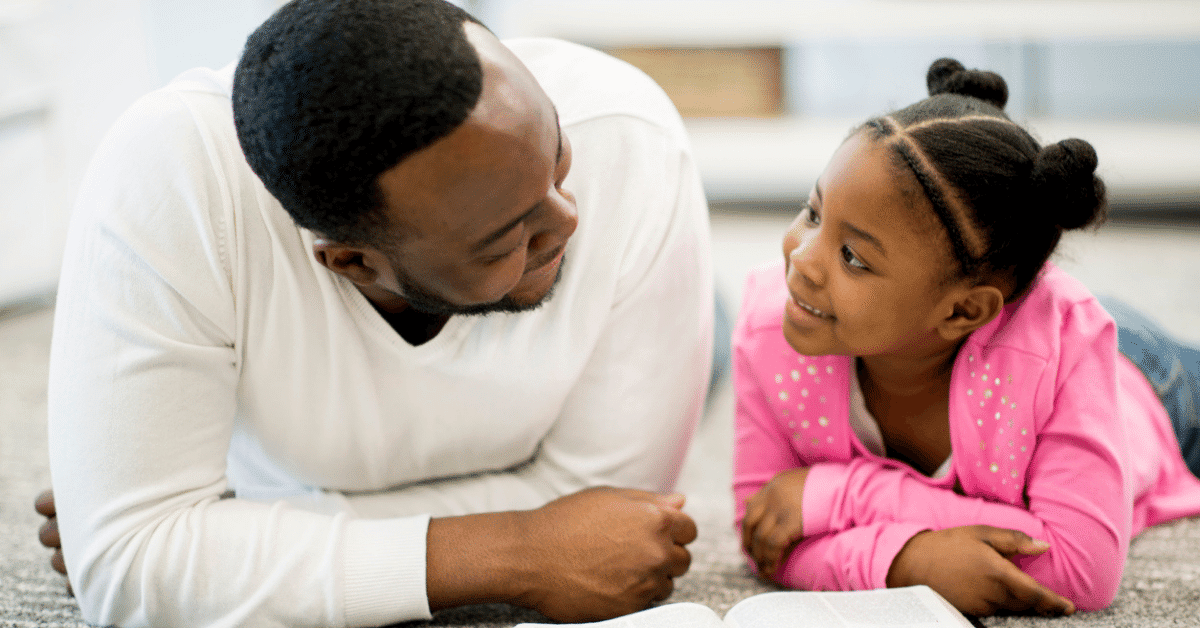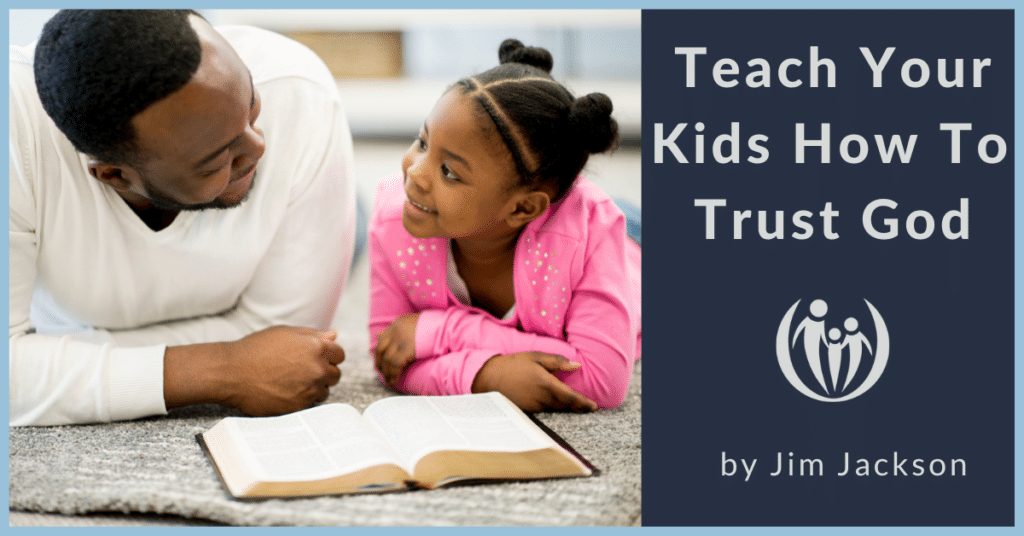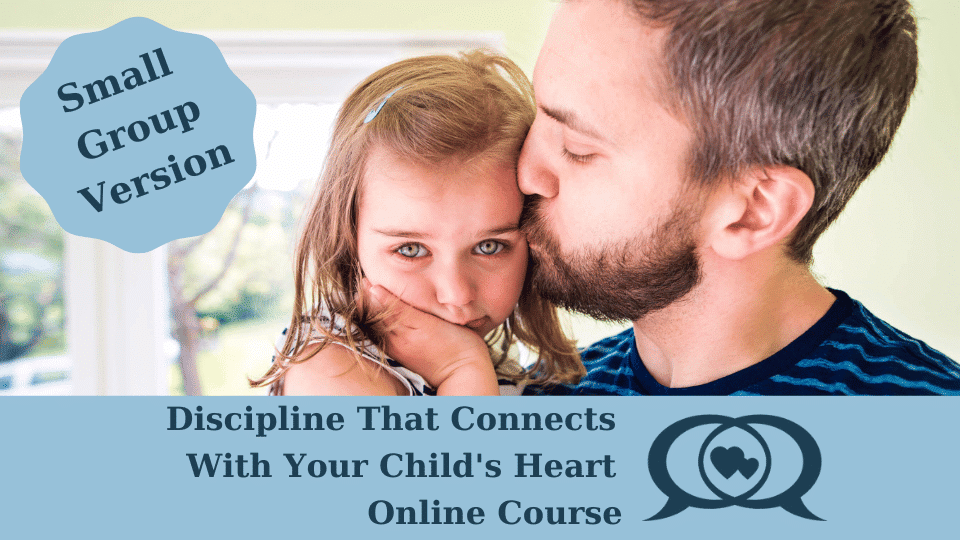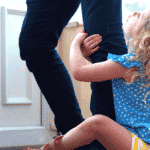
Teach Your Kids How to Trust God

Parents who value their faith long to teach their children to trust God and walk in a vibrant, resilient relationship with Christ. Being involved in a local faith community is certainly a vital part of that. But as important as worship, Bible teaching, and Sunday school can be, they’re usually enjoyable and don’t often provide real-time opportunities to learn to trust God for something challenging.
There is no more powerful time to model and talk about trusting God than when you are struggling with anxiety. And I’ve certainly had those opportunities!
Teaching kids to trust God… when you feel anxious yourself
Anxiety. I have struggled with it all my life. My family knows it. My kids know it. But most others don’t know it unless I let them get close. Talking about how to trust God during hard times pushes me to a vulnerable place. My struggle with anxiety has been a lifelong journey to trust God in the midst of uncertainty.
I’ve learned to wear a public face that masks the inner turmoil. But the knot of worry in my stomach rarely goes away. It sometimes grows to aches or even pangs that have no physical diagnosis.
And occasionally, sleepless nights when my body tingles with stress as I fight for rest.
And the pacing.
It used to drive my wife crazy sometimes, but she has come to peace with it over the years. And I have, too, in a way. All the little things I’ve learned to do, including help from doctors and therapists, and perhaps most importantly, pastors, help me cope.
Wise counsel from these professionals has helped protect others from my pervasive inner struggle.
When I am anxious, my kids are the first to know. Even when they were little, they recognized, without having words to describe it, the little twitch in my lip, the slight quiver in my voice, and even my quicker pace as I moved about the house. My kids are sometimes more aware of my anxiety than I am.
A radar exists between parents and children that senses even the slightest anomaly. When the radar picks up anxiety, the anxiety spreads.
And kids are always learning as they watch us deal with anxiety and stress. For better or for worse.
When my kids were young—and even now that they’re grown—I wanted to help them know what it means to be human, how to wrestle with faith, and how to cope with life’s challenges. I also want them to see that my faith is unwavering even though the forces that provoke my anxiety can be intense. Teaching kids how to trust God is all about showing kids how to trust God.
How do you teach your kids to trust God in a chaotic world?
Does it feel like there is something disturbing in the news every single day? The globe is dotted with wars, mass shootings have escalated dramatically since 2012, and it seems like natural disasters are happening on repeat.
And then, remember 2020? The remnants of COVID-19 anxiety hang with us.
And on top of that, there are financial, relational, and health pressures that are entirely unique to you. No parent has ever walked through your particular combination of stressors before.
Amid all this, you are charged with modeling for your kids how to navigate anxiety and find peace in Christ.
But Jesus understands. And He calls you to parent your kids no matter the circumstances or stresses swirling in the world around you.
Jesus says, “In this world, you will have trouble. But take heart! I have overcome the world.” (John 16:33)
Strengthen your own spiritual life first
As you face your anxieties and your children’s anxieties…pray and breathe. You may feel tasked with teaching your children to trust God, even when you may be struggling to do this yourself. Remember: God called you, and you are not alone.
Develop a habit of connecting with God that stabilizes you
Over the years, my wife Lynne has been an example of steadiness. She has cultivated habits that anchor her to God, and one of those habits has been regular time in scripture. Pretty much every single day. Even with young kids and a part-time job. When we go through tough times, she often will share a Bible verse that has helped her. And journaling is a go-to means of processing and gaining insight and peace in those really tough times.
Through many challenges, this lifelong habit has made her a steady example of faith. She demonstrates what it means to “build your house on the rock.”
I’m more distractible than Lynne and not as disciplined with my habits. But I have found my own way into refreshing my soul and connecting with God regularly. I pray while I water the garden, often praying out loud. I enjoy reading the chapter surrounding the verse-a-day and love challenging podcasts or YouTube clips that encourage my faith. Not exactly Biblical hermeneutics, but it fits my need for variety, diverse viewpoints, and most importantly – it feeds my soul and refreshes my faith.
Grow serenity, courage, and wisdom
We both also find strength and peace in Reinhold Niebuhr’s Serenity Prayer when anxiety knocks at our door and will often repeat it out loud to each other.
“God, grant me the serenity to accept the things I cannot change,
courage to change the things I can,
and wisdom to know the difference.”
This is the same prayer that guides thousands through their journey with addiction and recovery. Yet, it could have been written about many of the challenges in the world today, including parenting.
Sometimes, it’s an uphill battle to walk in serenity, courage, and wisdom, and we can be besieged by anxious thoughts that want to take charge of our minds. But we can take captive every thought to make it obedient to Christ. This isn’t a burdensome obligation but a beautiful invitation to freedom and peace.
Recognize catastrophizing thoughts and take them “captive”
Our good friend and colleague, Chad, encourages parents he coaches to notice thoughts that are “on fire” and “catastrophizing.”
Catastrophizing: seeing catastrophes and impending disaster when maybe there’s only a challenge; expecting that the worst possible outcome will occur in a particular situation.
Catastrophizing is anxiety on steroids! And it’s definitely not a thought pattern in step with the Spirit. So catch yourself. Catch your thoughts before they take you captive!
When your thoughts flow from beliefs that your problems are bigger than God, stop. Get back to scripture and pray with confidence.
In the NIV, the word “remember” appears in the Bible 166 times. Most of the time, it’s either God “remembering” His beloved people or it’s a call to His people to remember His faithfulness. No problem is too big for the God of Abraham, Isaac, and Jacob.
Remember your God.
Remember what is true.
Remember God’s faithfulness through challenges and trials. Because who can add an hour to their life by worrying?
There is a “peace of God, which transcends all understanding.” And it comes from letting your mind dwell on “whatever is true, whatever is noble, whatever is right, whatever is pure, whatever is lovely, whatever is admirable—if anything is excellent or praiseworthy.” (Philippians 4:6-8)
Teach kids to trust God with their anxiety
But what are practical ways you can help your kids navigate their anxiety and faith? Your children will face stress and anxiety-producing challenges of all kinds in life. That is something you can count on.
Trust is not something we learn well when life is smooth and easy. So “don’t waste a good crisis” when the challenges are still the relatively minor ones of childhood.
Anxiety is the golden opportunity to learn true, resilient trust in God.
How can you help your kids cultivate a solid trust in God in the middle of challenging circumstances?
Looking for practical ideas, I asked our Connected Families community, “How are you guiding your children through their anxieties about the heavy issues of our times?”
Be truthful about hard realities
One parent wrote, “We don’t want to lie to our kids.” And that’s an excellent principle to stand by. The truth may be hard, but walk with your kids through it, not around it.
A key to talking well with kids about anxiety is being willing to talk about your own faith journey and being honest and authentic. That’s when you can speak of God’s truth in compelling ways.
One mom reported her kids barraged her with anxious questions because they were distraught about their chronically ill grandmother: “Will Nana be OK? Will we ever see her again? What if she dies?”
She wrote,
“I try to be very honest that everybody dies, and so, ‘Yes, someday Nana will die, and so will everyone else, including us. But I don’t think Nana will die anytime soon. And, for us, as Christians, we have a hope that goes beyond death.’
For my kids, pointing out that even Jesus suffered death has really helped with the anxiety. Yes, we must all die. But Jesus did, too, and He doesn’t call us to endure anything that He didn’t endure as well. And after death, there’s something so wonderful to look forward to.
No, we don’t wish that day to come early because we have lots to do before then, but when that day comes, we know we will enter into the best party ever. Death isn’t the end of the story. It’s just one more step.”
In a lot of ways, that’s the Sunday School answer. But I imagine this mom knew that for her kids’ benefit, she had to more than say these words; she had to believe them with confidence. Then, those truths could connect well with her kids’ hearts.
And that is our fight—to believe that God’s desire is to bless us, even in the challenges.
The Gospel gives us the big-picture perspective that makes facing some of the challenging realities of the world around us more manageable.
You can’t promise your kids that someone they love will never die. It’s not in your power to keep that promise. But you can point your kids to where your hope rests. That’s the big-picture perspective that makes navigating these anxieties a little easier.
As this mom continued,
“While I think she’ll be coming to visit us as soon as she can, I can’t promise you that Nana won’t die. So, again, it’s been about reminding them that God has given Nana a wonderful life and has a calling for her that’s different from anyone else’s. God will know when it’s the right time to ‘call her home.’”
Regardless of what topic is making your kids anxious, it’s important to follow this mom’s example by not minimizing the problems. You don’t want to make unrealistic statements or promises you can’t keep, like, “Grandma won’t die,” or “Everything will be fine,” or “Nothing bad will ever happen to us.”
Help them understand that God will be with us and strengthen us, even when things don’t work out the way we want them to. This will deepen an assurance that builds eternal perspective and faith, not false hope in life circumstances.
Your job is to help your kids find peace and to trust God, even if the truth is hard.
Teach kids to trust God by releasing anxiety through prayer
Weaving prayer into the routines of your home makes it more natural for your child to learn to trust God. Writing concerns or worries on a kitchen chalkboard as kids bring them up can make it easy to remember to pray about anxious topics at dinner time.
Stella and Pete, parents of two teens, realized their whole family was feeling pretty stressed and anxious one summer.
“We called a family meeting and asked if everyone would be willing to meet for prayer every day. Everyone in the family agreed to come together for about 20 minutes of prayer in the evening. Then, those who wanted to go to bed could, and those who wanted to stay up longer could do that. We decided on a different theme to pray about for every day of the week—things like school, racial reconciliation, missionaries we financially support, and specific things we felt anxious about.
We knew extended everyday family prayer was not sustainable for us, especially during our busy, variable school schedule, but we committed to it for a whole summer. It helped us get through a tough season, deepened our connection as a family, and strengthened our trust in God! When our oldest left for college, she seemed fairly equipped to trust God with all the stressful changes she was going through, and I’m guessing those prayer times were part of what prepared her for that.”
Teach kids to trust God by anchoring in scripture together
Parents also shared with us how beneficial it has been to help kids memorize the potent scripture they need to get through school anxiety or worries about other situations.
This was true for our son Noah. When he shared with Lynne how anxious he felt about going to middle school, they memorized Philippians 4:6,7 together, and that became a favorite verse of his.
One mom shared how she and her anxious daughter, Allison, memorized Joshua 1:9, an encouragement to be strong and courageous instead of fearful.
“On a particularly tough, anxious school morning before a choir concert, we repeated Joshua 1:9 slowly and thoughtfully three times. Then we closed our eyes, prayed, and listened for God’s ‘still small voice.’ Allison had a profound experience of God’s presence and protection. She smiled her way through the concert, and it was also a turning point for her in trusting God and walking in faith, not anxiety.”
Sarah shared the power of creative conversations about anxiety and scripture when kids were most open to talking – at bedtime, of course:
“Anxieties and worries tend to surface a lot at bedtime. We’ve talked about taking thoughts captive, even using hand motions to illustrate snatching that thought in your fist and then asking if that thought is obeying Jesus or if maybe it’s a lie to trick us. We’ve also talked a lot about Philippians 4:8 and how to train our minds to replace those thoughts that feel overwhelming with truths. I’ve had our kids list as many lovely things as they can or ask God to help them think of more. (He created all the lovely things, so His list will never run out!)”
Embrace the power of modeling trust in God
God knew we’d struggle with anxiety, and that includes our kids. It’s fascinating to find out what were the most searched Bible verses each year. If scripture searches are any indication, anxiety appears to be the most fundamental challenge common to mankind. Notice the theme of these most-searched verses. It reveals how much people need God’s presence and strength in their anxiety:
- 2017: “This is my command — be strong and courageous! Do not be afraid or discouraged. For the Lord your God is with you wherever you go.” Joshua 1:9
- 2019: “Don’t worry about anything, but in everything, through prayer and petition with thanksgiving, present your requests to God.” Philippians 4:6
- 2021: “But seek first the kingdom of God and his righteousness, and all these things will be provided for you.” Matthew 6:33 – (as the economy recovered from the pandemic…)
And the big winner in recent years?
- 2018, 2020, and 2022: “So do not fear, for I am with you; do not be dismayed, for I am your God, I will strengthen you and help you; I will uphold you with my righteous right hand.” Isaiah 41:10
I believe that the repeated commands to be strong and courageous instead of anxious were never a condemnation of our anxious struggles. They hold vital, life-giving promises from God to strengthen us:
- I am with you every step of the way.
- Replace your anxiety with thanksgiving and prayer (Philippians 4:7…and I’ll guard your heart).
- Seek Me first, and I will care for you.
- I will strengthen you and help you.
Lean into these promises!
Talk about them as a family and how they help you trust God.
Here are a few questions to get you started:
- What situation are you facing?
- What not-so-true beliefs are you tempted to let take charge of your mind?
- What scripture has anchored you in your struggle?
- What new and true beliefs do you hold now?
- How has God demonstrated His care for you in past struggles?
Talking about God’s past faithfulness to your family can strengthen all of you in tough times. Lynne and I listen to “The Goodness of God” and weep with gratitude during our really tough moments.
Even if your kids aren’t willing to engage in potentially uncomfortable conversations about trusting God with hard things, you can intentionally model thoughtful discussions in front of them. Your kids are listening in!
One mom wrote,
“Our kids have very different personalities. One will engage and talk through a bunch of anxious, big feelings. The other doesn’t want to at all. But he’ll listen in from the other room and occasionally choose to engage in the conversation. We can’t force it. But he knows we are discussing hard things and that big, anxious feelings are okay.”
God put each one of us in the time and place He determined (with the children He determined) so that we “would seek him and perhaps reach out for him and find him…” Acts 17
So, when anxiety and doubt creep in, you have a powerful opportunity to demonstrate to your children what diving deeper into your faith looks like.
Will they see you be authentic in your struggle?
Will they see you reach out to God and find Him in your time of need?
Will they see you remember the promises of scripture and His past faithfulness?
Knowing that your child will face anxiety in life, take the opportunity to turn challenging situations into eternally significant discipleship.





